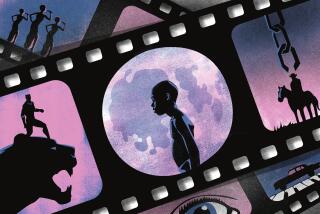A Cultural Salvo, Not a True Epic
- Share via
Oprah Winfrey calls “Beloved” the African American equivalent of “Schindler’s List.” To be sure, every ethnic group has a right and perhaps even a duty to project its painful history onto the silver screen. If white Southerners of generations past were entitled to “Birth of a Nation” and “Gone With The Wind,” then surely the black experience in the South can be told in film, too, from “Cabin in the Sky” to “Rosewood.”
Once upon a time, Hollywood recreated history with regularity; wizened character actor George Arliss made a career in anachronistic costume, playing everyone from Benjamin Disraeli to Cardinal Richelieu to Baron Rothschild. But today, studio-nomics cuts against routine historicism. So instead filmgoers get “event” histories, from “Titanic” to “Saving Private Ryan.” The blitz for “Beloved,” which opens Friday, includes Oprah on a dozen magazine covers--including, curiously enough, a dishy spread in Vogue--promoting the three-hour movie.
The tagline of the film--”The past has a life of its own”--is a Southern Gothicism that echoes the grandmaster of that genre, William Faulkner, who observed that “The past is not over and done, it is not even past.” “Beloved” is based on the true story of a black woman who tried to kill her children rather than see them returned to slavery. And while the film, drawn from Toni Morrison’s novel, strives toward what historian Thomas Carlyle called “the inner fact of things,” its magical-realist Anne Rice-ish dimension undercuts its moral and historical impact.
But the bigger problem of “Beloved” is its emphasis on victimization. While every tragedy is worth telling, sometimes bleak sadness is crowded out by even bleaker sadness, leaving some genocides little noted, as in Armenia, Cambodia, and today, Rwanda. Closer to home, the recent murder of Matthew Shepard, a gay college student in Laramie, Wyo., reminds us that new tragedies are always in the making. But if one were searching for the saddest news of the day, it might be the fate of 54 aborted fetuses, dumped on the side of a California freeway last year. Just last Sunday, each was buried in a tiny white casket, then given a funeral mass celebrating “the sacredness of life.” Don’t hold your breath for Hollywood to make that movie.
But if brutality is the norm in human history, then what’s most dramatically compelling are chronicles of men and women who rise above the iniquity around them. Which explains why the 1989 movie “Glory”--in which Denzel Washington won an Oscar for his portrayal of a black soldier fighting for Union and Emancipation in the Civil War--has achieved such resonance.
In that glorious vein, a forthcoming book, “Lincoln’s Men: How President Lincoln Became Father to an Army and a Nation,” by William C. Davis, draws heavily from the letters of soldiers in the Union Army, 360,000 of whom died in that noble cause. It’s stirring stuff, because it’s real: “The Ruler of the Earth,” wrote William Dunham, 36th Ohio regiment, in 1861, “will not allow this [war] to stop till slavery is blotted from this land.” So before ticket-buyers trek to see an allegory of injustice, they might stop at a bookstore to buy an actual account of those who ended that injustice.
Of course, one might conclude from the movie that Morrison’s real target is not so much slavery as it is masculinity. The men in the film, black and white, are either irrelevant or irredeemably evil--so evil that they would steal a mother’s milk from her hungry baby. When a male character tells Winfrey, “I never mistreated a woman in my life,” she snaps back: “Well, that makes one of you.”
As a group, women deserve their place in the cinematic sun, but the unmistakable message of “Beloved” is not the promise of harmony but rather the persistence, even the permanence, of male-female inequality. And so “Beloved” may not be a work of historical memory but rather another salvo in the continuing culture war that rages today.
More to Read
Only good movies
Get the Indie Focus newsletter, Mark Olsen's weekly guide to the world of cinema.
You may occasionally receive promotional content from the Los Angeles Times.










